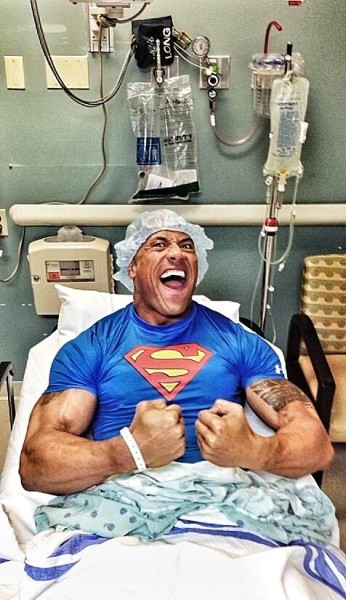Nelson Mandela Hospitalized with Inguinal Hernia

Former South African President Nelson Mandela has been hospitalized for elective surgery. The 93-year-old Nobel Prize winner underwent the repair of an inguinal hernia.
Mandela has reportedly had a “longstanding abdominal complaint.” South African President Jacob Zuma told CNN:
He was in good health before admission in hospital but doctors felt the complaint needed a thorough investigation. He underwent a diagnostic procedure as part of his ongoing medical management. We are happy that he is not in any danger and thank the doctors for their hard work and professionalism.
After the procedure, Mandela was described as “comfortable” and in “a satisfactory condition.”
What is an inguinal hernia?
An inguinal hernia is a condition in which part of the small bowel, bulges through a weak area in the lower abdominal muscles.
An inguinal hernia occurs in the groin—the area between the abdomen and thigh. This type of hernia is called inguinal because fat or part of the intestine slides through a weak area at the inguinal ring, the opening to the inguinal canal.
An inguinal hernia appears as a bulge on one or both sides of the groin. An inguinal hernia can occur any time from infancy to adulthood and is much more common in males than females. Inguinal hernias tend to become larger with time.
What are the types and causes of inguinal hernia?
There are two types of inguinal hernia, each with a different cause.
 Indirect inguinal hernias are congenital hernias, meaning they are present since birth, although they may not become apparent until later. They are much more common in males than females because of the way males develop in the womb.
Indirect inguinal hernias are congenital hernias, meaning they are present since birth, although they may not become apparent until later. They are much more common in males than females because of the way males develop in the womb.
In a male fetus, the spermatic cord and both testicles initially form inside the abdomen. Before birth, they normally travel through the inguinal canal into the scrotum, the sac that holds the testicles.
Sometimes the entrance of the inguinal canal at the inguinal ring does not close as it should just after birth, leaving a weakness in the abdominal wall. Fat or part of the small intestine can slide through the weakness into the inguinal canal, causing a hernia. In females, an indirect inguinal hernia is caused by the female organs or the small intestine sliding into the groin through a weakness in the abdominal wall.
Indirect hernias are the most common type of inguinal hernia. Premature infants are especially at risk for indirect inguinal hernias because there is less time for the inguinal canal to close.
 Direct inguinal hernias are caused by degeneration of the connective tissue of the abdominal muscles. This causes weakening of the muscles during the adult years.
Direct inguinal hernias are caused by degeneration of the connective tissue of the abdominal muscles. This causes weakening of the muscles during the adult years.
Direct inguinal hernias occur only in males. A direct hernia develops gradually because of continuous stress on the muscles. Factors that cause pressure on the abdominal muscles can worsen the hernia. These include:
- sudden twists, pulls, or muscle strains
- lifting heavy objects
- straining on the toilet because of constipation
- weight gain
- chronic coughing
Indirect and direct inguinal hernias usually slide back and forth spontaneously through the inguinal canal and can often be moved back into the abdomen with gentle massage.
What are the symptoms of inguinal hernia?
Symptoms of inguinal hernia include:
- a small bulge in one or both sides of the groin that may increase in size and disappear when lying down; in males, it can present as a swollen or enlarged scrotum
- discomfort or sharp pain—especially when straining, lifting, or exercising—that improves when resting
- a feeling of weakness or pressure in the groin
- a burning, gurgling, or aching feeling at the bulge
What are “incarcerated” and “strangulated” inguinal hernias?
An incarcerated inguinal hernia is a hernia that becomes stuck in the groin or scrotum and cannot be massaged back into the abdomen.
An incarcerated hernia is caused by swelling and can lead to a strangulated hernia, in which the blood supply to the incarcerated small intestine is jeopardized. A strangulated hernia is a serious condition and requires immediate medical attention. Symptoms of a strangulated hernia include:
- extreme tenderness and redness in the area of the bulge
- sudden pain that worsens in a short period of time
- fever
- rapid heart rate
Left untreated, nausea, vomiting, and severe infection can occur. If surgery is not performed right away, the condition can become life threatening, and the affected intestine may die. Then that portion of the intestine must be removed.
How is inguinal hernia diagnosed and treated?
To diagnose inguinal hernia, the doctor takes a thorough medical history and conducts a physical examination. The person may be asked to stand and cough so the doctor can feel the hernia as it moves into the groin or scrotum. The doctor checks to see if the hernia can be gently massaged back into its proper position in the abdomen.
Inguinal hernias may be repaired through surgery. Surgery is performed through one incision or with a laparoscope and several small incisions.
Surgery for inguinal hernia is usually done on an outpatient basis. Recovery time varies depending on the size of the hernia, the technique used, and the age and health of the patient.
Complications from inguinal hernia surgery are rare and can include general anesthesia complications, hernia recurrence, bleeding, wound infection, painful scar, and injury to internal organs.


























0 comments